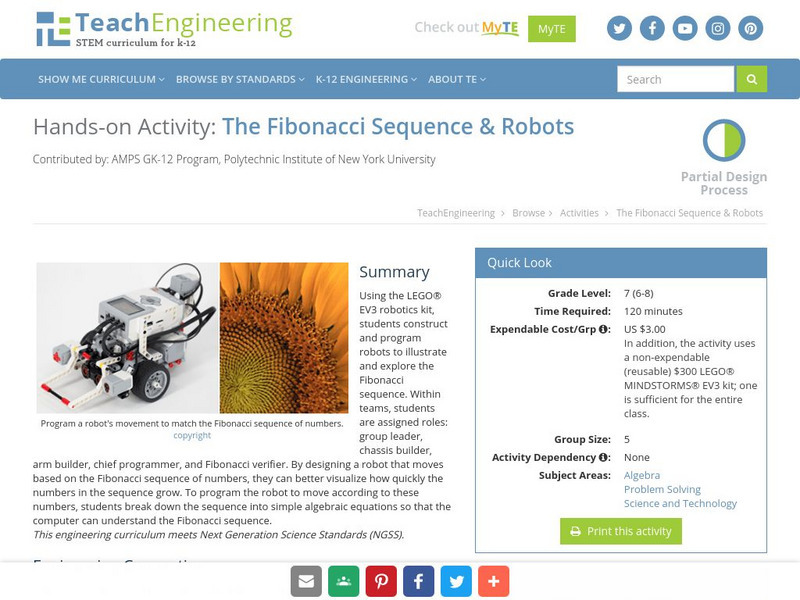Hi, what do you want to do?
EngageNY
Percent Rate of Change
If mathematicians know the secret to compound interest, why aren't more of them rich? Young mathematicians explore compound interest with exponential functions in the twenty-seventh installment of a 35-part module. They calculate future...
EngageNY
Are All Parabolas Similar?
Congruence and similarity apply to functions as well as polygons. Learners examine the effects of transformations on the shape of parabolas. They determine the transformation(s) that produce similar and congruent functions.
EngageNY
Algebraic Expressions—The Distributive Property
Do your classes truly understand the distributive property? Use a demonstrative lesson to represent the distributive property in various ways. Learners solidify understanding by creating a geometric pattern for distributive...
Virginia Department of Education
Special Right Triangles and Right Triangle Trigonometry
Right triangles are so special! Use special right triangles to discover the trigonometric ratios. Pairs construct special right triangles and find the values of the ratios of the sides. In the process, they discover the ratios stay the...
Virginia Department of Education
Equilibrium and Le Chatelier’s Principle
The best part of learning about equilibrium is that nothing changes. Young chemists observe four demonstrations during this instructional activity: equilibrium in a saturated solution, equilibrium with an acid-base indicator, equilibrium...
Curated OER
Math Games for Skills and Concepts
A 27-page packet full of math games and activities builds on algebra, measurement, geometry, fractional, and graphing skills. Young mathematicians participate in math games collaboratively, promoting teamwork and skills practice.
Polar Trec
Calorimetry Lab
Young people between the ages of 11–13 need on average about 2,000 calories per day. Within the lab, groups learn about calorimetry and respiration. They explore how it pertains to humans and animals living the Arctic where cold...
Curated OER
Measuring Angles
Solve and complete 18 problems about angles. First, demonstrate that each conjecture is false by giving a counterexample. Then write the inverse, contrapositive, and converse for the each statement. In addition, write a...
Virginia Department of Education
Mystery Anions
Lost an electron? You should keep an ion them. Young chemists learn qualitative analysis in the second lesson plan of an 11-part chemistry series. After observing reactions of simple salts, the teacher provides pupils with unknown...
EngageNY
Equivalent Rational Expressions
Rational expressions are just fancy fractions! Pupils apply fractions concepts to rational expressions. They find equivalent expressions by simplifying rational expressions using factoring. They include limits to the domain of the...
Virginia Department of Education
States of Matter
Scientists have been studying exothermic reactions before they were cool. The lesson begins with a discussion and a demonstration of heat curves. Scholars then determine the heat of fusion of ice and the heat needed to...
EngageNY
Modeling Riverbeds with Polynomials (part 1)
Many things in life take the shape of a polynomial curve. Learners design a polynomial function to model a riverbed. Using different strategies, they find the flow rate through the river.
EngageNY
When Can We Reverse a Transformation? 2
The second lesson plan on finding inverse matrices asks class members to look for a pattern in the inverse matrix and test it to see if it works for all matrices. The teacher leads a discussion to refine the process in finding...
Curated OER
Geometric Series 2.3
Learners will determine if a series of numbers are geometric, arithmetic, or neither and determine the common ratio if appropriate. In this geometric units lesson, students given a geometric series, determine the general term, and the...
Curated OER
The Electrophoresis of Human Hemoglobin
Students are presented with a scenario that requires them to electrophoreses human hemoglobin samples in order to confirm a diagnosis of sickle cell anemia and/or to determine whether individuals in the scenario are carriers of the...
Pennsylvania Department of Education
Freckle Face
Students collect and record data. In this early data analysis lesson, students gather data about their partners face. As a class, the students use tally marks and pictographs to record the data and answer question about the information...
Curated OER
Beat the Heat: Meander Through These Books
A hazy, daisy, lazy summer reading list for math (and interdisciplinary) learning.
Curated OER
Paper Helicopters
In this paper helicopter worksheet, students design and experiment making a paper helicopter to explore how some things fall and how varying the size of the rotor blades affect the way a helicopter spins.
Curated OER
Adventures in Electrical Engineering
Students explore electricity by conducting a series of experiments. In this physics lesson, students discover the relationship between current, voltage and resistance. They calculate voltage and power in a given system.
TeachEngineering
Teach Engineering: The Fibonacci Sequence & Robots
Using the LEGO NXT robotics kit, students construct and program robots to illustrate and explore the Fibonacci sequence. Within teams, students are assigned roles: group leader, chassis builder, arm builder, chief programmer, and...
Khan Academy
Khan Academy: Sums of Consecutive Integers
Practice finding the nth number in a sequence of consecutive numbers based on the sum. Students receive immediate feedback and have the opportunity to try questions repeatedly, watch a video or receive hints.
PBS
Pbs Learning Media: Arrangement 3
Matt's third table arrangement helps fit all 20 workers at five tables in this video segment from Cyberchase.
Illustrative Mathematics
Illustrative Mathematics: Christina's Candies
The teacher will pose a sequence of questions for students to solve using objects, pictures, or equations. Students will develop a sense of quantities and how they are related to a problem situation.



























